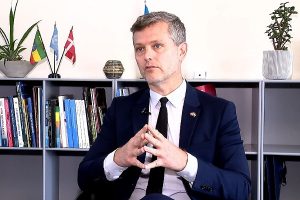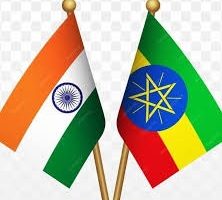
BY SOLOMON WASSIHUN
Six months after the thrilling breaking news from Pretoria, Ethiopia has come a long way, from a country embroiled in a raging awar to one that is an example of a successfully negotiated peace settlement. The CoHA, which political analysts initially assumed would be short-lived, has borne fruit and paved the way for a lasting peace. The return of peace has brought a variety of positive changes to the country’s political and socio-economic situation.
First and foremost, the peace agreement has silenced the guns. The destructive fires of war that consumed the lives and livelihoods of citizens have been extinguished. Tens of thousands of civilians who had fled their villages are now returning to their homes. Non-military combatants who participated in the war are returning to their civilian lives. Damaged infrastructures and social facilities are being repaired and going operational. Now that the peace process is on the right track, children are going to schools, farmers to their fields, and businessmen to their shops. The open markets in northern rural Ethiopia are full of commodities, brimming with buyers and sellers as they used to be. The roads joining Tigray, Amahara, and Afar towns to any of the neighboring regions are open to the public, and civilians are freely moving in northern Ethiopia almost without any hindrance. Leaders of the warring parties are sitting side by side declaring the war days are behind Ethiopia and vowing their unwavering commitment to bring lasting peace to the nation.
The peace deal has also brought about policy changes of donor countries toward Ethiopia. They are now beginning to rescind the policy decisions they made during the war period, as a result of which Ethiopia was subjected to various economic sanctions including denial of trade privileges, and suspension of development and budgetary aids. For instance, the US suspended Ethiopia from AGOA, severely paralyzing the export businesses that were sending products to US markets. As a result of that, several companies went out of business, and many factory workers, most of whom were women that are the breadwinner of their families, lost their jobs. And also the Eu held up a budgetary aid worth several million euros.
But now, with the implementation process of the Pretoria peace deal winning their confidence, donor countries and multinational agencies are now being reversing their punitive decisions, and instead unraveling plans for supporting the peace-building efforts and injecting stimulant packages to invigorate the economy that was drowsing during the two year war period. It is quite encouraging to see that both the Americans and the Europeans expressed support for the successful implementation of the peace agreement. Senior officials of the American government and the EU as well as leaders of some of the major European counties and multinational agencies have already paid a visit to Addiis Ababa to see for themselves the actual situation on the ground.
To mention a few, America’s top diplomat, the US Secretary of State came to Ethiopia for the first time since he took office in 2021, only after the implementation of the peace agreement took hold. Similarly, the UN Chief also came to Ethiopia for the first time since the ‘North War’ broke out. He arrived in Addis Ababa three weeks after the signing of the CoHA in Pretoria. Lately, the leaders of the two major European countries, the Italian Premier and Germany’s Chancellor were also here in Addis during the last month. Giorgia Meloni’s of Italy arrival to Addis last month was the first visit of a Western head of government to Ethiopia since the signing of the Pretoria peace deal. It was also the first time for the German leader to set foot in Ethiopia, although it was not his first African tour since he took charge as Germany’s number one.
The EU has formally notified its appreciation for the progress of the ongoing implementation of the peace deal, and that it is committed to normalize relations with the Ethiopian government and providing support to the peace-building efforts. In an official statement, it issued recently that it has unanimously approved a new and ground-breaking decision to gradually normalize relations with Ethiopia. “This decision opens a new chapter in our partnership and stresses that Ethiopia is a key strategic partner for the EU in the Horn of Africa and the Red Sea and that the EU stands ready to support further progress on the path towards lasting peace.”, says the statement.
The depth and breadth of the EU – Ethiopia relations are quite immense. After all, Ethiopia and the EU cemented their historical partnership in 2016 with the signing of a joint declaration, the EU-Ethoipia Strategic Engagement between the then Ethiopian Premier Halimariam Desalegn and The EU’s Commission president, Jean-Claude Juncker. Based on the strategic Engagement, the two sides have been working on vast areas of cooperation including regional security, human rights, governance, and migration. Thus the restoration of all these areas of cooperation back to life after 2 years of stagnation means a lot to expedite soicio-economic development and make big differences in making a quick of recovery the nation from the ravages of the devastating war.
A week after the EU statement, the US government made a similar announcement expressing its full support for the implementation of the peace agreement and praising the progress made on the ground in the peace-building efforts. “The United States commends the parties for the significant progress on COHA implementation, which has led to the restoration of essential services, the flow of humanitarian aid, TPLF turnover of heavy weapons, release of detainees, the initiation of a comprehensive and inclusive transitional justice process, and establishment of an interim regional administration in the Tigray Region….. The United States reaffirms the importance of its partnership with Ethiopia and commitment to work together on these and other issues of mutual interest.” says the US government statement issued from its Department of State.
There is no surprise in the striking similarity in the gist of the statements of the Americans and the Europans. The thumbs up the two major power players gave on the progress of the CoHA implementation is quite encouraging. It boosts confidence for all stakeholders in the peace process to forge ahead with their effort to achieve their goals of establishing lasting peace and stability. However, while the words of pledges of support, encouragement, and praise are positive, some parts of the statement issued by the US government go even further to provide instructions on the implementation process. That part of the statement is not constructive to the peace process, it is rather disruptive.
It is tantamount to interference and meddling in the activities of the negotiating parties and the concerned body monitoring and evaluating the implementation of the peace agreement. It is clear for all to see that the two negotiating sides are working amicably to carve out realistic practical and efficient strategies to fully implement the peace accord in a way that considers the interests of all sides, and leave no one behind. And there is a competent body [MVCM] appointed by the AU, African Union, to monitor and evaluate the implementation of the peace agreement. The peace process has been successfully going through difficult challenges over the last 6 months, through close consultations and concessions of negotiating parties. That situation should be allowed to continue undisturbed until the completion of the implementation process.
Foreign powers may play a constructive role in providing technical and logistical support to the implementation of peace agreements, if and when it is required. From now on, they should fully restore their economic cooperation activities with Ethiopia without ifs and buts. Moreover, they should not stick their nose in every detail of the affairs of the peace process. Doing the contrary would be more detrimental than beneficial. The implementation of the peace agreement is being smoothly handled by committed negotiating parties and a competent team of monitors [MVCM team]. They do not need anyone to provide them with checklists of how to go about their mission. Instead of prescribing instructions to the peace process, the world power players would rather focus on devising ways to mobilize resources to adequately provide support for the hundreds of thousands of Ethiopian IDPs in the war-affected regions who still need humanitarian assistance.
If they really mean to be part of the restoration of peace and normalcy, then the West should draw a checklist ensuring adequate material and technical supplies for reconstruction efforts. Here we are talking about rebuilding numerous damaged schools, clinics, bridges, and roads, as well as rehabilitating those physically and mentally scarred by the war, like disabled combatants, orphaned children, rape victims, widowed women, and so on. After all, world powers should be more focused on the overall outcome of the process rather than the detailed intermediate steps of how the agreement is being implemented. They should be patient enough, hold their opinions to themselves, and let the peace builders, facilitators, and regulators finish their job undisturbed without any noise and disruptive meddling.
THE ETHIOPIAN HERALD TUESDAY 16 MAY 2023




